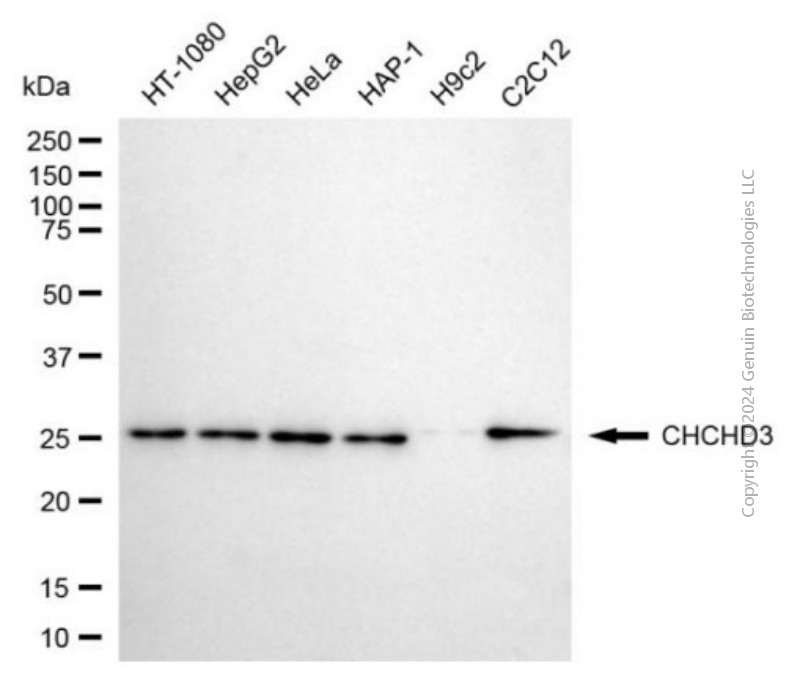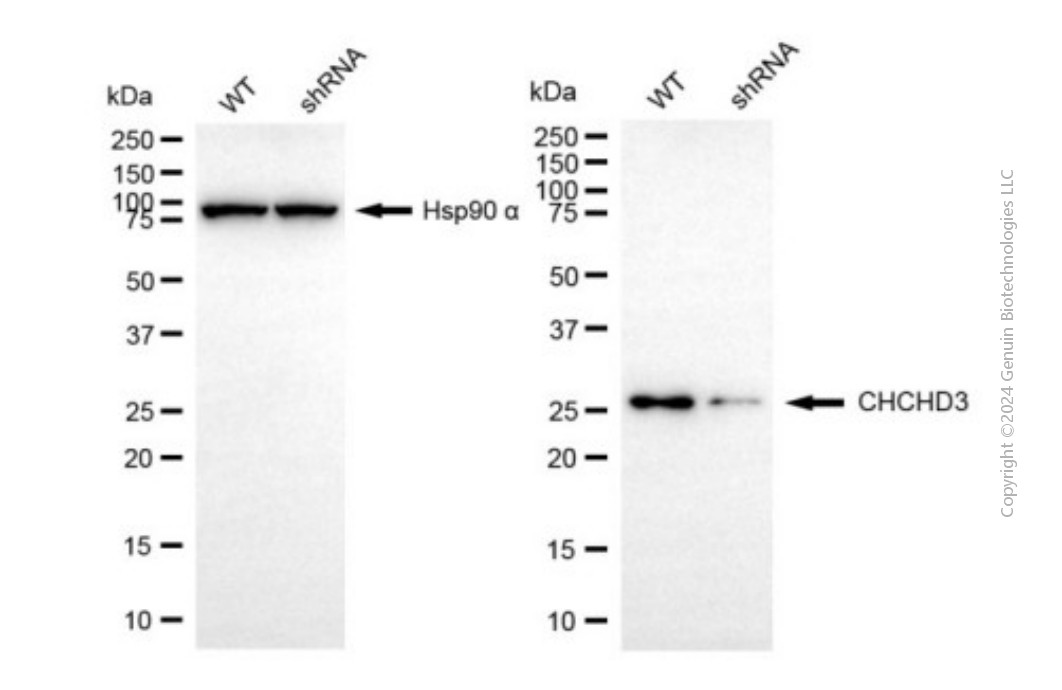KD-Validated Anti-CHCHD3 Mouse Monoclonal Antibody
Mouse monoclonal antibody
- SPECIFICATION
- CITATIONS
- PROTOCOLS
- BACKGROUND

Application
| WB |
|---|---|
| Primary Accession | Q9NX63 |
| Reactivity | Rat, Human, Mouse |
| Clonality | Monoclonal |
| Isotype | Mouse IgG1 |
| Clone Names | 24GB6565 |
| Calculated MW | Predicted, 26 kDa, observed, 26 kDa |
| Gene Name | CHCHD3 |
| Aliases | CHCHD3; Coiled-Coil-Helix-Coiled-Coil-Helix Domain Containing 3; MINOS3; PPP1R22; MICOS19; Mic19; Mitochondrial Contact Site And Cristae Organizing System Subunit 19; Mitochondrial Inner Membrane Organizing System 3; Protein Phosphatase 1, Regulatory Subunit 22; MICOS Complex Subunit MIC19; FLJ20420; Coiled-Coil-Helix-Coiled-Coil-Helix Domain-Containing Protein 3, Mitochondrial; Coiled-Coil-Helix-Coiled-Coil-Helix Domain-Containing Protein 3; MIC19 |
| Immunogen | Recombinant protein of human CHCHD3 |
| Gene ID | 54927 |
|---|---|
| Other Names | MICOS complex subunit MIC19, Coiled-coil-helix-coiled-coil-helix domain-containing protein 3, CHCHD3, MIC19, MINOS3 |
| Name | CHCHD3 |
|---|---|
| Synonyms | MIC19, MINOS3 |
| Function | Component of the MICOS complex, a large protein complex of the mitochondrial inner membrane that plays crucial roles in the maintenance of crista junctions, inner membrane architecture, and formation of contact sites to the outer membrane (PubMed:25781180, PubMed:32567732, PubMed:33130824). Plays an important role in the maintenance of the MICOS complex stability and the mitochondrial cristae morphology (PubMed:25781180, PubMed:32567732, PubMed:33130824). Has also been shown to function as a transcription factor which binds to the BAG1 promoter and represses BAG1 transcription (PubMed:22567091). |
| Cellular Location | Mitochondrion inner membrane {ECO:0000250|UniProtKB:Q9CRB9}; Lipid-anchor; Intermembrane side {ECO:0000250|UniProtKB:Q9CRB9}. Cytoplasm. Nucleus Mitochondrion |
| Tissue Location | Detected at low levels in brain, placenta, lung, liver, kidney and pancreas with increased levels in heart and skeletal muscle. Higher expression in primary lung cancers than in normal lung tissue. |

Thousands of laboratories across the world have published research that depended on the performance of antibodies from Abcepta to advance their research. Check out links to articles that cite our products in major peer-reviewed journals, organized by research category.
info@abcepta.com, and receive a free "I Love Antibodies" mug.
Provided below are standard protocols that you may find useful for product applications.
If you have used an Abcepta product and would like to share how it has performed, please click on the "Submit Review" button and provide the requested information. Our staff will examine and post your review and contact you if needed.
If you have any additional inquiries please email technical services at tech@abcepta.com.














 Foundational characteristics of cancer include proliferation, angiogenesis, migration, evasion of apoptosis, and cellular immortality. Find key markers for these cellular processes and antibodies to detect them.
Foundational characteristics of cancer include proliferation, angiogenesis, migration, evasion of apoptosis, and cellular immortality. Find key markers for these cellular processes and antibodies to detect them. The SUMOplot™ Analysis Program predicts and scores sumoylation sites in your protein. SUMOylation is a post-translational modification involved in various cellular processes, such as nuclear-cytosolic transport, transcriptional regulation, apoptosis, protein stability, response to stress, and progression through the cell cycle.
The SUMOplot™ Analysis Program predicts and scores sumoylation sites in your protein. SUMOylation is a post-translational modification involved in various cellular processes, such as nuclear-cytosolic transport, transcriptional regulation, apoptosis, protein stability, response to stress, and progression through the cell cycle. The Autophagy Receptor Motif Plotter predicts and scores autophagy receptor binding sites in your protein. Identifying proteins connected to this pathway is critical to understanding the role of autophagy in physiological as well as pathological processes such as development, differentiation, neurodegenerative diseases, stress, infection, and cancer.
The Autophagy Receptor Motif Plotter predicts and scores autophagy receptor binding sites in your protein. Identifying proteins connected to this pathway is critical to understanding the role of autophagy in physiological as well as pathological processes such as development, differentiation, neurodegenerative diseases, stress, infection, and cancer.



